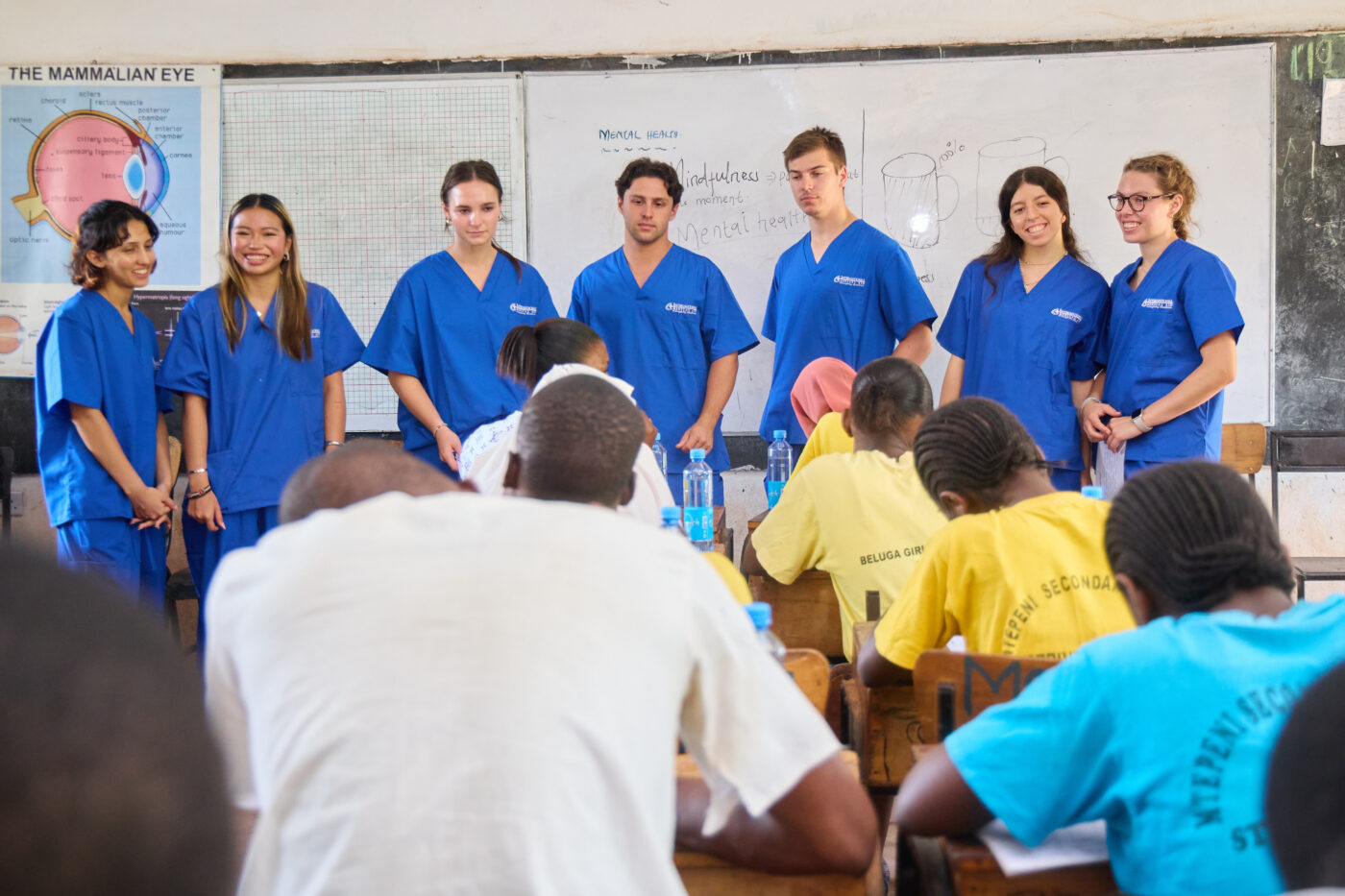Knowing in your heart that you want to go to medical school and become a doctor isn’t an easy process. But once you make that decision, the journey can prove to be both fruitful and rewarding. However, that doesn’t mean that you know everything once you enroll in medical school. Every physician has things that they wish they knew before they entered their first year of medical training. That’s why here you’ll learn 5 things that you should know before you even start your first day of medical school.
1. Develop Strong Relationships With More Experienced Medical Students
Once you’ve combed through the best premed majors, taken your MCATs, and gone through the battery of medical school interviews, you’re finally ready to start medical school. In your first few days, you will meet a lot of new people. Many of them will be first-year students at your school.
While making friends with other first-years is extremely valuable, it’s also advantageous to seek out friendships with more experienced students. There are a few reasons for this. For one thing, you can gain an academic edge because these students will have already taken your current classes. Older students can give you study tips, advice on dealing with difficult professors, and even social opportunities that go beyond your immediate first-year student circle.
There is also the fact that establishing your professional medical network is of the utmost importance. Starting this process when you’re in medical school will serve you well in a wide variety of ways. By starting in your first year of medical school, you can slowly build a personal and professional network that can take you into practice all over the country and even globally.
You can meet older medical students in a few ways. Start by joining a few student associations in your medical school. For example, if you belong to a minority group, your school will often have student groups serving these populations. You can follow the same bit of advice if you’re a female physician. Many schools have associations for female medical students. You can also join national medical associations for female physicians, physicians belonging to different minority groups, and medical students looking to go into certain specialties.
2. Don’t Play The Comparison Game
It’s extremely tempting to look around at your classmates and try to figure out your ranking among them. Please don’t do this! You might do this because you have an ultra-competitive nature. Or you might wonder if you really, truly belong there in your medical school among your classmates.
Doing all of this is completely natural. But it doesn’t mean that it’s a good idea. When it comes time to take an exam or perform during your clinical rotations, don’t compare yourself with your fellow students. The comparison game will only lead to a world of hurt to the player.
Here are a few tips for keeping your eyes on the ultimate prize: becoming a doctor.
- Create your own metrics for academic performance. If you meet them, celebrate and move on. Don’t consider what your classmates are doing. This tip is about you and your own metrics.
- There’s nothing wrong with wanting to be at the top of your medical school class. But taking care of your mental health comes before academic accolades. So study hard, but take care of yourself.
- Find fellow students who will support you on your journey. All of you will go towards the same goal of becoming a physician, so find people who are friendly, fun, and supportive of your particular academic goals.
3. Do The Things That Give You Joy
During your medical school years, it can become very easy to put aside your hobbies. On some level, it might make sense. You have exams, clinical rotations, as well as the need to take the USMLE. You won’t have time to watch five hours of Netflix when you have an anatomy exam that’s worth half of your course grade.
But you don’t want to give up your hobbies forever. You have a long period of medical training before you. What you will need are your core hobbies and activities that you can return to during the tough times of your training. For example, you might have loved using Netflix to decompress during your premed years. A session or two of a few hours of Schitt’s Creek never hurt anyone. But eventually, the time will come where you will need to get back to the books.
If a couple of hours of Netflix isn’t your idea of a productive hobby, many medical students and physicians swear by their favorite form of physical activity as a stress reliever. It wouldn’t hurt to perhaps take a morning where you don’t have a lot going on to go for a run. You might find that you love it. If you live in a picturesque area, perhaps you could take your partner or a friend with you on a hike. Lastly, you can avail yourself of plenty of subscription services for exercise classes for yoga, martial arts, weight lifting, and a whole range of physical activities. Even free YouTube videos can serve as a way for you to get some exercise into your day.
Don’t want to exercise? That’s fine. What’s necessary is finding a couple of ways to relieve stress during your medical school years. You will certainly need them! Want to spend time with friends? Find time to do things such as going out to a meal or staying in and ordering a pizza and watching your favorite movies. You can combine exercise and friend time by playing basketball or taking a yoga or other group exercise class together. Lastly, you can do anything from puzzles to reading non-academic novels to listening to your favorite podcasts. Whatever brings you joy is what will get you through your medical training.
4. Connect With Female Physicians and/or Minority Physicians
As stated in the first tip, creating your professional network in medical school will have many benefits. This is especially true if you’re a female and/or a student who belongs to a minority group. You can not only get inspired by these intelligent, determined, and accomplished individuals. As a student, you can also gain valuable insight into the realities of practicing medicine as a woman and/or as a minority.
You can build your professional medical network in a number of ways. Start by keeping in contact with the physicians you worked with during your shadowing and clinical experiences during your undergraduate years. You never know how those connections could pan out.
Another tip to keep in mind is to remain friendly with most of the physicians that you meet during your training. Note that these professionals are busy, so you don’t want to make a nuisance of yourself. But keeping in contact with different doctors can allow you to build a robust professional network over time.
If you’re a medical student who’s a woman and/or a member of a minority group, joining national medical associations can act as a great way to build your network. The following list is a partial listing of national groups for female doctors and/or doctors that belong to minority groups:
- American Medical Women’s Association
- Association of American Indian Physicians
- National Council of Asian Pacific Islander Physicians
- National Hispanic Medical Association
- National Medical Association (for physicians of African descent)
- Association of Black Women Physicians
5. Save As Much Money As You Can During Your Medical School Years
No one needs to tell you that the road to medical school and beyond is long, hard, and expensive! If you’re not getting 100% financial support from your parents or a partner, you will need to get your financial affairs in order as soon as humanly possible. Doing this can ensure that you have the funds to do things such as preparing for the USMLE, meeting your financial needs for groceries and rent during medical school, and moving to your residency site after medical school.
The following tips can better ensure that you live a financially responsible life during medical school:
- Pay off your loans early: According to the American Medical Association, the average debt of medical students is around $167,000. If you don’t have to borrow quite as much one year or have some money left over in your monthly budget, pay off some of your loans. Most medical students will pay back around twice what they originally borrowed. Paying off this amount now will serve you well when you’re not paying off loans in your retirement years.
- Get rid of that expensive coffee habit: You might have your favorite local coffee place. Plus, you will often use caffeine to power numerous study sessions and early mornings. But those $5 lattes add up! Whenever possible, make your coffee at home. You could also cut down on your coffee habit by drinking less. Less caffeine consumption equals more money in your pocket.
- Get rid of cable television and streaming services: Get rid of Netflix? It’s doable. You won’t have time for 5 hour Netflix binging sessions when you’re knee-deep in biochemistry notes. Plus, cable television and all of those streaming services add up. If you insist on having these services, you’re throwing away money on television you don’t even watch often. Use the money you save towards loan repayment.
- Try to find affordable living arrangements: If at all possible, get a roommate. You will spend a ton of time in the library anyway. Medical training will take a lot of money, so don’t spend it on a palatial apartment in which you won’t spend a lot of time.
Additional Tips for Success in Medical School
6. Master Time Management Early
Medical school demands an intense workload, and without strong time management skills, it’s easy to fall behind. Develop a system that works for you, whether it’s using a digital planner, time-blocking your day, or following a structured study schedule. Prioritize high-yield study materials and allocate dedicated time for both studying and self-care. Learning to manage your time effectively in your first year will help you balance coursework, clinical rotations, and personal life throughout your medical career.
7. Learn How to Study Efficiently, Not Just More
Many students enter medical school thinking they need to study all day, every day. Instead, focus on active learning strategies like spaced repetition, Anki flashcards, and practice questions. Passive reading and endless note-taking won’t be as effective when absorbing the sheer volume of information in medical school. Figure out early on what study techniques work best for you so that you can maximize retention and minimize burnout.
8. Get Comfortable with Failure and Adaptation
No matter how smart or prepared you are, you will face challenges and setbacks in medical school. Whether it’s struggling with a tough exam, feeling out of place in a clinical rotation, or receiving constructive criticism from an attending physician, learning to adapt and push forward is essential. Medicine is a lifelong learning process, and the sooner you develop resilience and the ability to learn from mistakes, the better physician you will become.
9. Build Strong Relationships with Faculty and Mentors
Your professors, advisors, and attending physicians can be some of your greatest resources. Actively seek mentorship from faculty members in your desired specialty or field of interest. Not only will they provide guidance and career advice, but strong relationships with faculty can also lead to research opportunities, clinical experiences, and strong letters of recommendation. Being proactive in networking early can set you apart later on.
10. Take Care of Your Mental and Physical Health
Medical school can be physically and emotionally draining, and burnout is a real concern. Develop habits early that prioritize your well-being, such as regular exercise, adequate sleep, and mindfulness practices. Don’t be afraid to seek help if you’re struggling—whether that’s through counseling, peer support, or taking breaks when necessary. A healthy physician is a better physician, and taking care of yourself is not a luxury, but a necessity.
Global Health & Internships Abroad
Global health experiences expand your understanding of healthcare beyond borders. Whether you are considering a healthcare internship in Peru, planning to volunteer in Tanzania, or looking for ways to make a lasting impact during your pre-med studies abroad, the following articles provide valuable insights. These resources will help you prepare, maximize your experiences, and understand how international internships shape professional growth and global perspectives.
- Healthcare Internships Abroad in Peru
- Pre Medicine Internships
- Healthcare Adventures: Mount Kilimanjaro
- Which Country is Best for a Medical Internship?
- Advancing Health Literacy Through International Medical Internships
Explore the World, Change Lives: IMA’s 2025 Programs in Kenya and Peru - Tips For Planning Your Pre-Med Internship Abroad In 2024
- How To Make The Most Of A Pre-Med Internship Abroad
- How Pre-Med Students Can Contribute To Peruvian Healthcare
- Tips For Documenting Pre-Med Internships In Peru
- Spanish Medical Phrases And Medical Terminologies For Interning in Peru
- Peruvian Public vs. Private Hospitals: Which Is Better For Pre-Med Interns?
- Strategies for Making a Lasting Impact as a Pre-Med Intern in Peru
- Reasons To Do A Pre-Medical Program In Peru
- What to Expect During Your First Week of Medical School
- Virtual Shadowing Opportunities: Are They Worth It?
See What a Life-Changing Global Health Adventure with International Medical Aid Looks Like - Volunteer In Tanzania: Info And Tips
- Things To Know Before You Volunteer In Tanzania
- 11 Fun Things To Do On Your Volunteer Breaks In Kenya
If you’re a student in need of medical experience for your medical school applications, apply for our Pre-Medical Internship Program. Not only will you have the opportunity to travel abroad, but you’ll gain valuable experience that will stand out to admissions committees.





